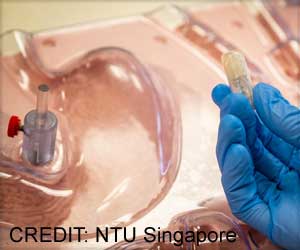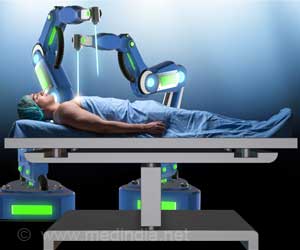
‘Newly developed tiny robotic capsule known as a Sonopill could one day help in screening colons for early signs of disease.’
Tweet it Now
Known as a Sonopill, the device could one day replace the need for patients to undergo an endoscopic examination, where a semi-rigid scope is passed into the bowel - an invasive procedure that can be painful.Micro-ultrasound images also have the advantage of being better able to identify some types of cell change associated with cancer.
The Sonopill is the culmination of a decade of research by an international consortium of engineers and scientists.
The consortium has developed a technique called intelligent magnetic manipulation. Based on the principle that magnets can attract and repel one another, a series of magnets on a robotic arm that passes over the patient interacts with a magnet inside the capsule, gently manoeuvring it through the colon.
The magnetic forces used are harmless and can pass through human tissue, doing away with the need for a physical connection between the robotic arm and the capsule.
Advertisement
Professor Pietro Valdastri, who holds the Chair in Robotics and Autonomous Systems at the University of Leeds and was senior author of the paper, said: "The technology has the potential to change the way doctors conduct examinations of the gastrointestinal tract.
Advertisement
"With this study, we show that intelligent magnetic manipulation is an effective technique to guide a micro-ultrasound capsule to perform targeted imaging deep inside the human body.
"The platform is able to localize the position of the Sonopill at any time and adjust the external driving magnet to perform a diagnostic scan while maintaining a high-quality ultrasound signal. This discovery has the potential to enable painless diagnosis via a micro-ultrasound pill in the entire gastrointestinal tract."
Sandy Cochran, Professor of Ultrasound Materials and Systems at the University of Glasgow and lead researcher, said: "We're really excited by the results of this feasibility study. With an increasing demand for endoscopies, it is more important than ever to be able to deliver a precise, targeted, and cost-effective treatment that is comfortable for patients.
"Today, we are one step closer to delivering that.
"We hope that in the near future, the Sonopill will be available to all patients as part of regular medical check-ups, effectively catching serious diseases at an early stage and monitoring the health of everyone's digestive system."
The Sonopill is a small capsule - with a diameter of 21mm and length of 39mm, which the engineers say can be scaled down. The capsule houses a micro ultrasound transducer, an LED light, camera and magnet.
A very small flexible cable is tethered to the capsule which also passes into the body via the rectum and sends ultrasound images back to a computer in the examination room.
The feasibility tests were conducted on laboratory models and in animal studies involving pigs.
Diseases of the gastrointestinal tract account for approximately 8 million deaths a year across the world, including some bowel cancers which are linked with high mortality.
Source-Eurekalert








